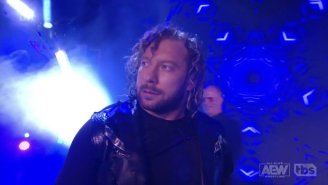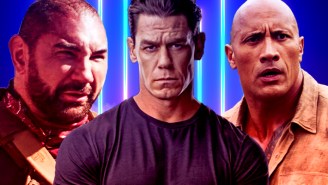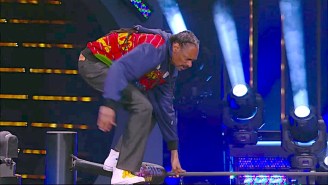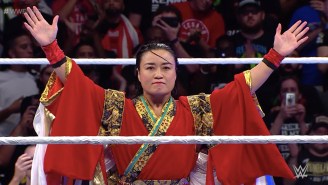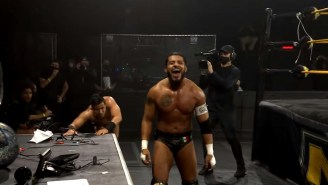You might not know this about WWE Hall of Famer Barry Windham, but he was born on the Fourth of July. It’s true! This year, Windham turns 57 years old, and his 20-year-plus pro wrestling career was a great one, especially if you happened to be a WCW or NWA fan growing up.
Widely regarded to be one of the most underrated performers of all time, and an integral part of the consensus “best” iteration of the Four Horsemen, Windham is a second generation wrestler, being the son of Hall of Famer Blackjack Mulligan. He also happens to be the uncle of current WWE Superstars Bo Dallas and Bray Wyatt, the latter of whom’s given first name is “Windham,” in honor of Barry.
ALSO in honor of Barry, here is a brief recap of his most memorable career highlights. Happy birthday, Widowmaker.
The U.S. Express captures the gold for the first time
Remember a couple of paragraphs ago, when I was talking about Bo Dallas and Bray Wyatt? They’re the sons of Mike Rotunda, perhaps best known as Irwin R. Schyster. Windham and Rotunda have been best friends throughout their wrestling careers, and Windham married Rotunda’s sister, so … you know … they’re family.
They also had their first major success in the world of pro wrestling together, working together as a tag team in the Florida territories before being signed together by WWF in 1984 as babyface tag team the U.S. Express. They gained popularity quickly, through a combination of talent, a great mouthpiece of a manager in “Captain” Lou Albano, and the can’t-miss entrance theme of “Born in the U.S.A.,” before those pesky issues like “copyright” and “licensing” came into play.
The U.S. Express captured their first world tag titles when they defeated the North South Connection of Dick Murdoch and Adrian Adonis, and back in the 1980s, anyone who beat up Adrian Adonis was pretty much a golden god in the eyes of wrestling fans.
Two-time champs, but this time for America
The U.S. Express got to be the first team to defend the WWF Tag Team Championship at a WrestleMania, but they also got to be the first team to lose them at the very first grandaddy of them all in 1985. The despised Iron Sheik and Nikolai Volkoff cheated to win the titles, but they would soon receive their comeuppance. American style.
Windham and Rotunda (who was called “Rotundo” throughout this WWF run, because WWF announcers have always, legitimately always had problems with names and pronunciation) would recapture the titles in June to become even greater American heroes somehow. The Dream Team of Brutus Beefcake and Greg Valentine would defeat the Express for the titles, and Windham and Rotuna/o would break up by the end of the year, as Windham left the company to head back to Florida.
The U.S. Express of Windham and Rotundo/a would last just one year in WWF (exactly one year, to the day), but they burned red-hot, won the tag titles twice, and were the fastest way possible to get to the United States.
Barry Windham becomes an iconic member of the Four Horsemen
Windham’s success in WWF was, of course, a drop in the bucket compared to his career with Jim Crockett, the NWA, and WCW. He’s best known and best remembered for being part of the Four Horsemen, and for good reason.
The seeds for Windham joining the Horsemen began in 1987, when Lex Luger began vying for Ole Anderson’s spot in the stable. Luger eventually got booted from the group, because historically, there’s nothing the Horsemen like better than making fools out of Luger and/or Sting. Luger teamed with Windham to get his revenge on the Horsemen, and the two defeated Arn Anderson and Tully Blanchard for the NWA tag titles at the first Clash of the Champions.
Of course, going back to what I said about the Horsemen taking absolutely any opportunity to make Lex Luger look foolish, Windham turned on Luger and took his spot on the Horsemen during a tag title defense against Arn and Tully, and the new Four Horsemen then held every title in the NWA, as Ric Flair was world champ, Windham was United States champ, and Arn and Tully had the tag belts once again.
This lineup is arguably the one people remember better than the original lineup with Ole Anderson, and the sheer talent and entertainment value provided by this iteration is one of the main reasons fans are constantly salivating to have all the members of a heel stable hold all the titles in a company. It’s just cool, dammit.
NWA World Heavyweight Champion
https://www.dailymotion.com/video/x3a6j1_the-great-muta-vs-barry-windham-nwa_sport
Windham went back to WWF for a short time in 1989 under the moniker “The Widowmaker,” but shortly returned to NWA and WCW after failing to make a significant number of widows. “The Widowmaker” was most notable for being in a book I bought at an elementary school book fair, which listed his finishing move as “the superplex,” and that was the first time I learned that a suplex can be even more super than I realized. (I liked suplexes a lot.)
He quickly rejoined the Horsemen, which now consisted of himself, Flair, Arn, and Sid Vicious, with Ole as their manager.
In 1991, Flair bolted for WWF while still NWA Heavyweight Champion, and the title was vacated. Windham and Lex Luger met in a steel cage at Great American Bash to determine a new champion, and they pulled off the rare double turn, as Luger won the title by dastardly means and hooked up with Harley Race as a manager, and Windham became an adored babyface once again.
It was in 1993 that Windham finally achieved the apex of his career, defeated the Great Muta at SuperBrawl III. Flair returned to the company that night and attempted to present the world title belt to Windham, but that and the Horsemen’s attempts to lure Windham back into the fold failed. Windham then became a “Lone Wolf,” the only natural enemy of four horses.
Windham would lose the world title to Flair at Beach Blast 1993, which was notable for the most a single beach was blasted in that calendar year. He never managed to win another world title, but we’ll always have 1993.
For the record, the WCW world champions in 1993: Masahiro Chono, the Great Muta, Barry Windham, Ric Flair, and Rick Rude. The WWE world champions in 1993: Bret Hart, Yokozuna, and Hulk Hogan. 1993 was wild for a whole bunch of reasons.
“Rap is Crap”
The post-NWA championship years for Barry Windham were the definition of a mixed bag. He hung around WCW for a couple more years before heading back to WWF in 1996, where he had a spectacularly short run as “The Stalker” before forming the New Blackjacks with the man who would eventually become JBL.
Windham, like nearly everyone else during the Monday Night Wars, had a cup of tea with nWo Hollywood before joining up with the “West Texas Rednecks” of Curt Hennig, Windham’s brother Kendall, Bobby Duncum, Jr., and eventually Curly Bill. The Rednecks are fondly remembered to this very day for their music video and hit single “Rap is Crap,” which was used as fodder for their feud with Master P and the No Limit Soldiers.
… Okay, so 1993 had absolutely nothing on 1999 in terms of being buck-wild. The definitive history of “Rap is Crap” can be found right here on this very website, so you should definitely read that, and you should spend the rest of your day watching the above music video. And for another very special anniversary, the Rednecks performed their song “live” on Nitro on July 5, 1999, so unwrap this anniversary present a day early:
(Please make note of Barry Windham’s exceptional, very legitimate drums-playing in that video.)
Happy birthday, Barry. Thanks for the memories and the reminder about what rap is, in your estimation.

